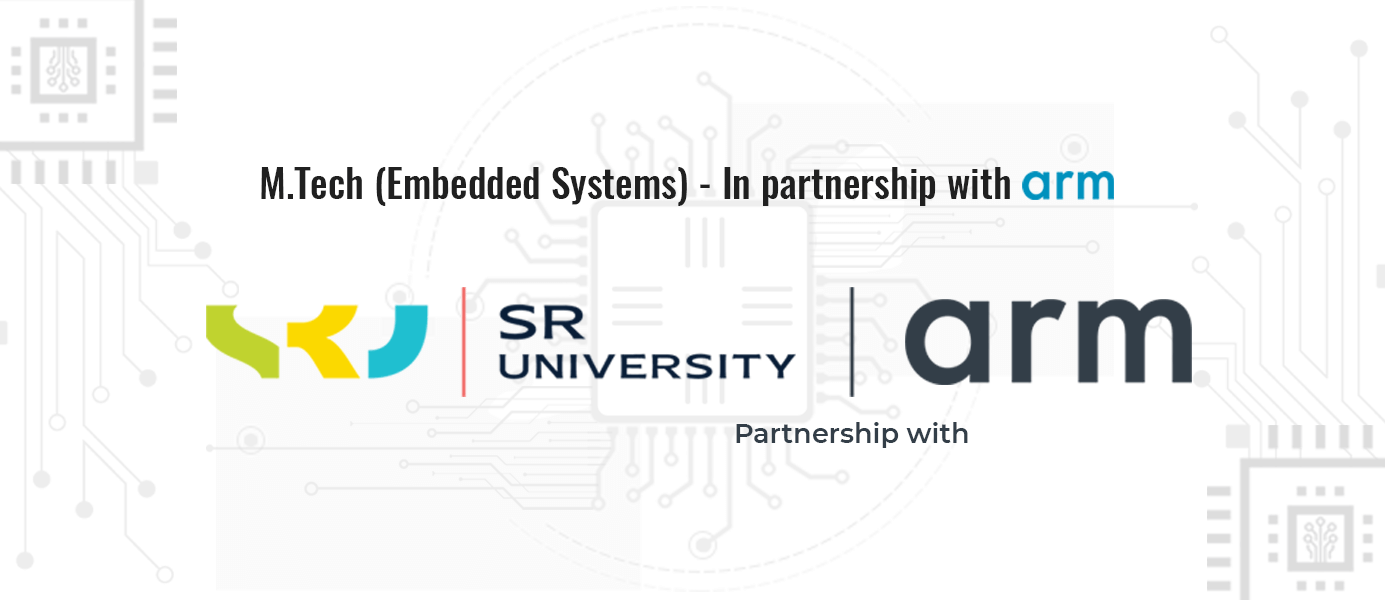M.TECH. EMBEDDED SYSTEMS (In partnership with Arm)

The course of study is designed to satisfy the increasing need for experts in Internet of Things (IoT) and embedded systems. Advanced subjects including software-defined radio, embedded system design, kernel programming, and Internet of Things protocols are covered in the curriculum to guarantee that students have both theoretical understanding and real-world experience. Through the Center for Embedded and IoT Systems (EIoT), students can participate in practical projects and internships that improve their industrial preparedness. The curriculum also places a strong emphasis on research and development, equipping graduates to take on challenging problems in a variety of industries, such as defense, healthcare, automotive, and telecommunications.
2 years (4 semesters)
The course equips students with the knowledge and skills necessary for pursuing advanced studies.
Industry-oriented courses in Internet of Things (IoT) and Embedded Systems prepare students for successful careers in the electronics and IT industries.
Comprehensive internship and placement support ensures outstanding career outcomes for students.
Industrial visits, workshops, hackathons, and project exhibitions provide students with opportunities to interact directly with industry professionals.
Students receive personalized mentorship and career guidance throughout their academic journey.
Active collaborations through MoUs with universities and industry partners foster research, innovation, and practical industry exposure.
Embedded Software Engineers
IoT Engineers
Hardware/Software Integration Engineers
Robotics Engineers
System-on-Chip (SoC) Developers
PEO 1: Design and develop innovative products in the field internet of Things (IoT) and embedded systems.
PEO 2: Pursue higher education or professional development for life-long learning.
PEO 3: Demonstrate entrepreneurial capabilities and contribute to community development through innovative and ethical practices.
PO1: An Ability to apply the knowledge of Science, Mathematics and Engineering principles for developing critical thinking and problem-solving skills.
PO2: An Ability to independently carry out research /investigation, development work to solve practical problems and to write / present a substantial technical report.
PO3: An Ability to function as a member of a multidisciplinary team with sense of ethics, integrity, and social responsibility.
PO4: An Ability to design and conduct experiments, analyze and interpret data, imbibe programming skills.
PSO1: An Ability to understand and use different software tools in the domain of embedded systems.
PSO2: Students should be able to demonstrate a degree of mastery over the area of embedded systems.
EMBEDDED SYSTEMS is an exciting, challenging and growing field which will spread through industry in future. With the advent of industrial automation, microcontrollers and applications have been around since the 1960’s in all manufacturing organizations, including chemical plants, automobile manufacturing units, nuclear plants, energy generation units, and the like. Every industrial sector viz., telecommunications, banking, health care, avionics, automobile, food processing, semiconductor electronics, defence etc., all use embedded systems to monitor and control the plants remotely. It should not be surprising that nearly 90 percent of the automation and applications end up in embedded systems.
Embedded systems and IoT are gaining importance in all aspects of engineering. It is expected that in the near future, no gadget will exist without software and embedded technology. IoT is connecting gadgets (things) through the internet and cloud. IoT is being implemented everywhere like in smart cities, security, smart agriculture and home automation. This has created a lot of buzz among industries and right now all the companies are looking for candidates who have practical experience with IoT. A Research and Advisory company predicted that 8.4 billion connected devices will be in use worldwide in 2017 and will reach 20.4 billion by 2020. In India alone, more than 1000 tech start-ups are engaged in IoT based projects, offering plenty of job opportunities.
Knowing the importance of such technologies, M.Tech (Embedded Systems) is launched in partnership with Arm, which is rapidly advancing IoT technologies through the design and development of the integral platforms, sensors, and subsystems that drive IoT performance. The courses of the program are designed with the involvement of industry partner Armto ensure that they match the global job market demand and reflect the current state of industry research areas. This collaboration facilitates knowledge sharing between both the organizations and improves students’ knowledge and skills in the aforementioned areas.
The students of the program will have an opportunity to work as iScholars at the Center for Embedded and IoT Systems (EIoT) which helps to gain hands-on experience and become industry-ready. The Center offers mini-projects, internship programs and projects in collaboration with Industries. A student can also explore other interdisciplinary research centers@SRU
This program provides a broad coverage of challenges and research issues to the design and management of automation.
The students are exposed to advanced courses such as IOT protocols, embedded system design, computing, kernel programming, software defined radio and many more.
The curriculum prepares students to take on complex challenges in the real world. Further it is helpful in continue their research and develop industrial applications.
Ample scope for pursuing interdisciplinary research through collaboration with Centers of IOT, Artificial intelligence and many more.
Hands-on experiential learning through remote labs that provide access to leading IoT platforms such as ARM Cortex based STM32, Raspberry Pi & Arduino.
Automotive
Medical electronics
E commerce
Software
Robotics
ARM
INTEL
Qualcomm
Siemens
Amazon
IBM
Embedded System developer
Algorithm Specialists
Citizen IoT Scientists
IoT Solution Architects
Chip Designer